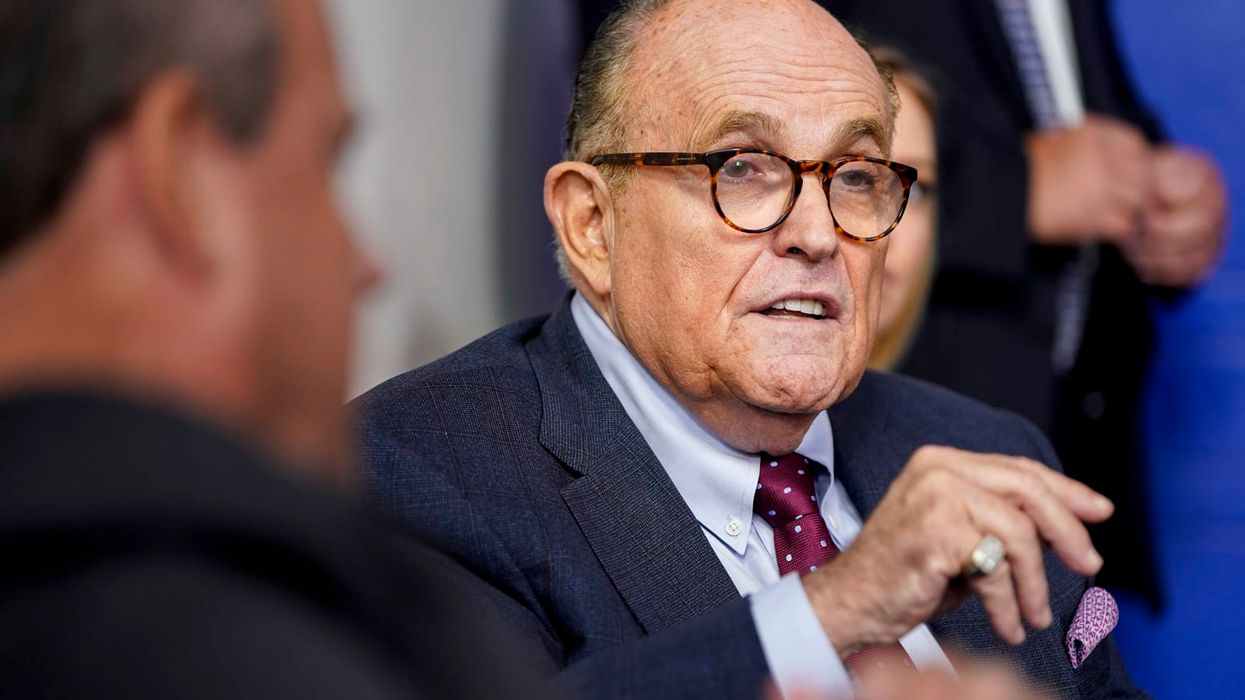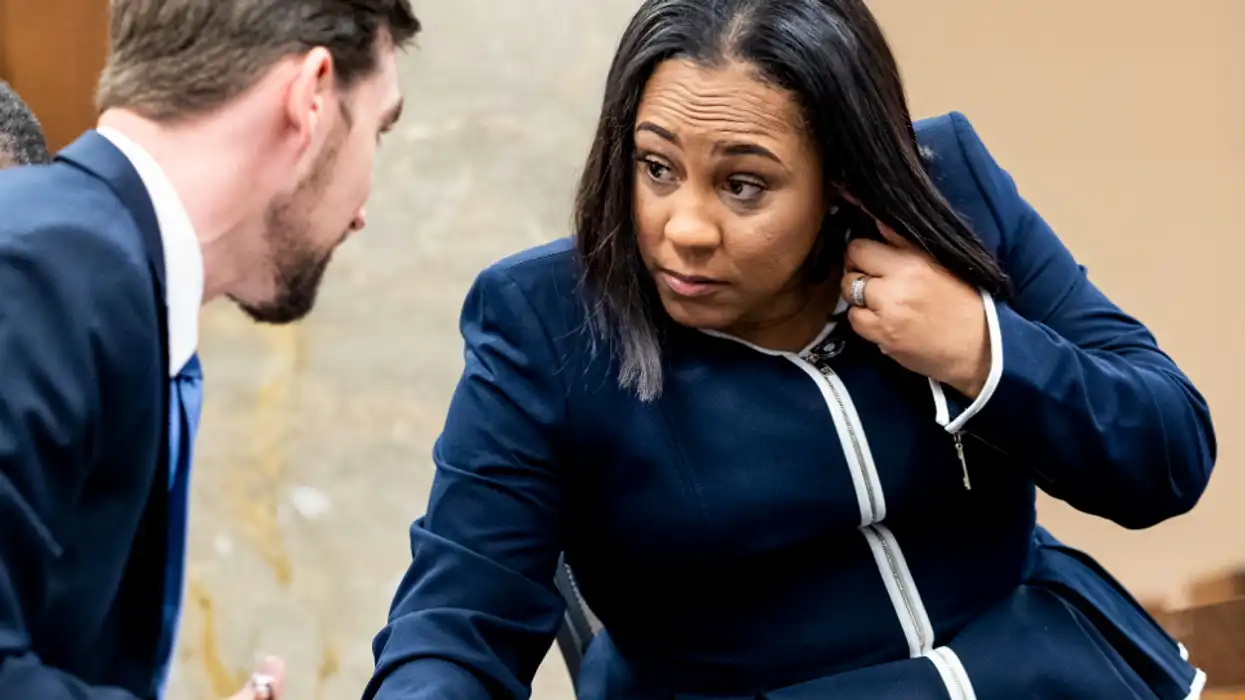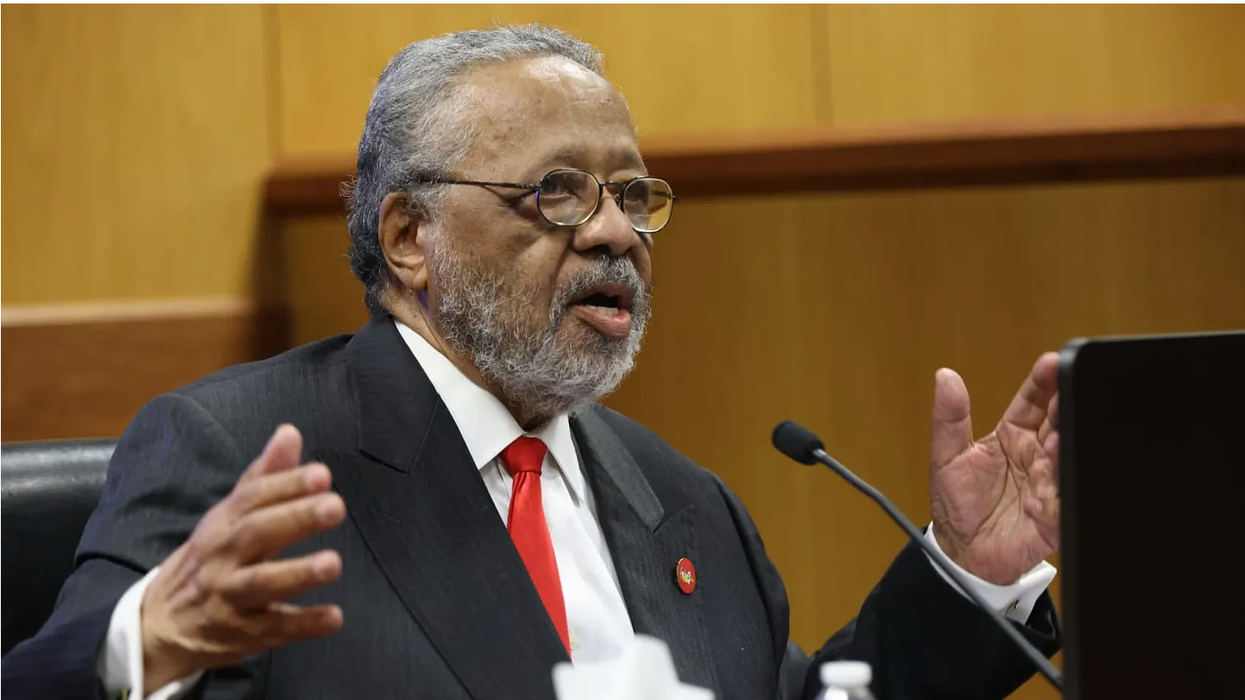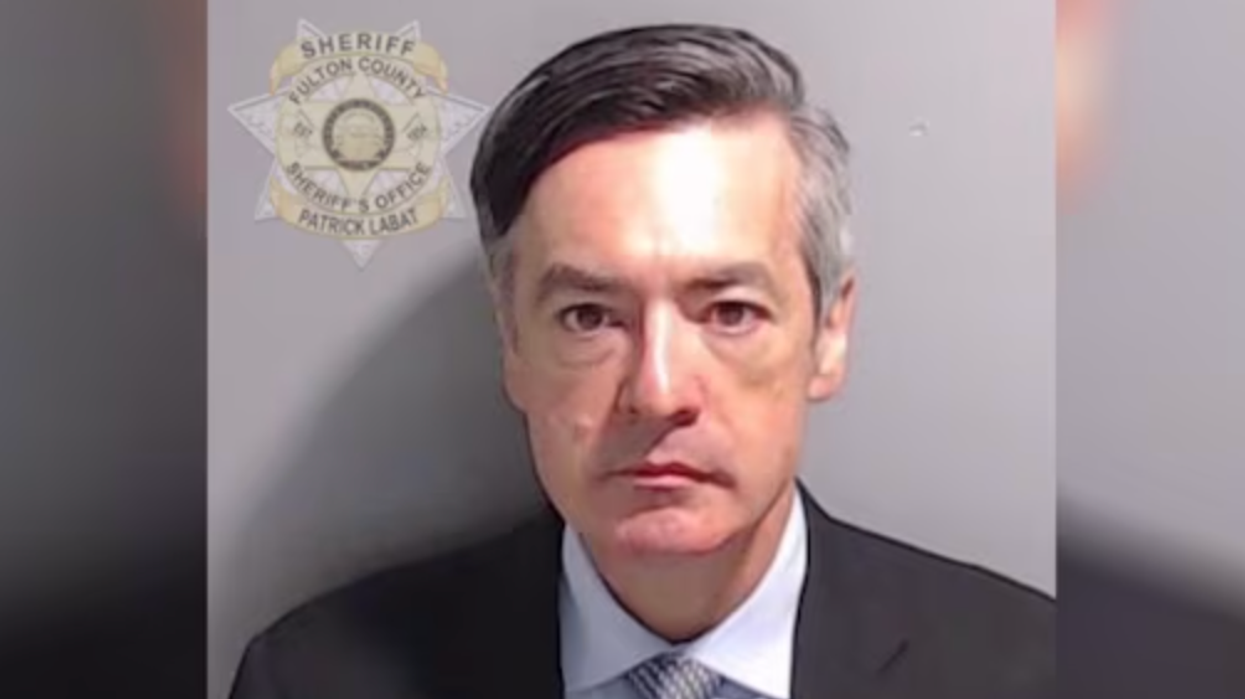Now we know what Fani Willis and her team of prosecutors were doing while newspapers and cable TV chryons were headlining that Sidney Powell’s co-defendant, Kenneth Chesebro, had not copped a plea deal with prosecutors. Willis and her team were videotaping Chesebro’s proffer of written, electronic, and oral information he could provide to prosecutors in return for a sentence of three to six years of probation, community service, and a fine for pleading guilty to a single felony charge in Georgia. Chesebro had faced seven counts involving his participation in a scheme to organize fake electors to file falsified electoral ballots for Donald Trump with the National Archives and the President of the Senate in an attempt to overturn the results of the 2020 election on January 6, when the Congress met to certify electoral ballots and declare Joe Biden winner of the 2020 election.
Willis has faced criticism ever since she empaneled an investigatory grand jury to look into what laws were broken by Trump and his compatriots in Georgia as they attempted to overturn the results of the state’s presidential election, won by Joe Biden. Willis was foundering, critics said, taking too much time on witnesses who refused subpoenas and had to be sued to get their testimony.
Then in August, when Willis finally brought her indictment against Trump and 18 co-defendants, critics said it was all just too much. How does she expect to get 19 defendants into one courtroom and run a prosecution against them? It was too unwieldly, many said, an overreach by a publicity-hungry local prosecutor trying to burnish her reputation by going after the former president, who was already facing indictment by the Special Counsel for committing many of the same crimes.
Then the Kraken cracked, and 24 hours later, so did the heretofore loyal Trump attorney Kenneth Chesebro.
Reading the 98 pages of the indictment of Trump and his 18 co-defendants, it’s hard to keep up with Chesebro, he was so busy sending emails, calling co-conspirators, and meeting with John Eastman and Rudy Giuliani and members of the Trump reelection team. After Trump lost more than 60 of his legal challenges to results of the election in battleground states, something had to be done.
And then came John Eastman and Kenneth Chesebro to the rescue with their Hail Mary scheme to put together slates of fake presidential electors for Trump in Nevada, Arizona, Wisconsin, Michigan, Pennsylvania, and Georgia and use them to disrupt the certification of the Electoral College ballots in Congress on January 6, 2021. The fake electoral ballots had to be signed in the states by December 14, when the real electors met and cast their ballots for Biden. Then the fake electoral ballots had to be filed with the National Archives, and transmitted to the President of the Senate -- Vice President Mike Pence -- in time for the meeting of the Congress.
Busy, busy, busy were Ken and Rudy and John and Donald. From the Fulton County indictment:
Act 39: “A memorandum was written by KENNETH JOHN CHESEBRO to James R. Troupis, an attorney associated with the Trump Campaign, and advocates for the position that Trump presidential elector nominees in Wisconsin should meet and cast electoral votes for DONALD JOHN TRUMP on December 14, 2020, despite the fact that DONALD JOHN TRUMP lost the November 3, 2020, presidential election in Wisconsin.”
Act 47: “KENNETH JOHN CHESEBRO stated in the e-mail that certain individuals associated with the Trump Campaign asked him ‘to help coordinate with the other contested States, to help with logistics of the electors in other States hopefully joining in casting their votes on Monday.’”
Act 49: “On or about the 10th day of December 2020, KENNETH JOHN CHESEBRO sent an email with attached documents to Arizona Republican Party Executive Director Greg Safsten and others. The documents were 'to be used by Trump presidential elector nominees in Arizona for the purpose of casting electoral votes for DONALD JOHN TRUMP on December 14, 2020, despite the fact that DONALD JOHN TRUMP lost the November 3, 2020, presidential election in Arizona. This was an overt act in furtherance of the conspiracy.”
Act 50: “KENNETH JOHN CHESEBRO sent an e-mail to Republican Party of Wisconsin Chairman Brian Schimming with proposed language for documents to be used by Trump presidential elector nominees in Wisconsin for the purpose of casting electoral votes for DONALD JOHN TRUMP on December 14, 2020, despite the fact that DONALD JOHN TRUMP lost the November 3, 2020, presidential election in Wisconsin.”
In Acts 51 through 53, Chesebro sent emails with proposed fake elector documents to officials in Nevada, Pennsylvania, and Georgia furthering the fake elector scheme.
Act 58: “KENNETH JOHN CHESEBRO sent an e-mail to Jim DeGraffenreid and stated that ‘the purpose of having the electoral votes sent in to Congress is to provide the opportunity to debate the election irregularities in Congress, and to keep alive the possibility that the votes could be flipped to Trump.’”
In Acts 59, 60, and 61, Chesebro sent more fake elector documents to members of the Trump campaign to be used by fake electors in Georgia and other states.
In Act 64, Chesebro conspired with Giuliani and a member of the Trump campaign to ensure that the media was not notified of a meeting of Trump fake electors in Wisconsin.
In Act 69, Chesebro sent the same package of suggested electoral ballot documents to co-defendant Michael Roman with the proviso that the documents were to be used in the Nevada fake elector scheme.
Act 70: “KENNETH JOHN CHESEBRO sent an e-mail to RUDOLPH WILLIAM LOUIS GIULIANI with the subject ‘PRIVILEGED AND CONFIDENTIAL Brief notes on President of the Senate strategy.’ In the email, KENNETH JOHN CHESEBRO outlined multiple strategies for disrupting and delaying the joint session of Congress on January 6, 2021, the day prescribed by law for counting votes cast by the duly elected and qualified presidential electors from Georgia and the other states. In the email, KENNETH JOHN CHESEBRO stated that the strategies outlined by him were ‘preferable to allowing the Electoral Count Act to operate by its own terms.’” (Its “own terms” being following the law and living up to the full meaning of how elections are certified in the Constitution.)
In Acts 71 and 72, Chesebro conspired with Giuliani and Roman to further the fake elector scheme in Georgia.
In Act 94, Chesebro was the recipient of an email from John Eastman laying out a strategy to avoid having the fake elector scheme considered in a hearing by the judiciary committee on the constitutionality of the Electoral Count Act. They were afraid a hearing might raise issues the Trump campaign did not want to bring up about their scheme to interfere with the Electoral College, especially if their scheme ended up before the Supreme Court.
Act 109: “On or about the lst day of January 2021, KENNETH JOHN CHESEBRO sent an email to JOHN CHARLES EASTMAN and unindicted co-conspirator Individual 3, whose identity is known to the Grand Jury. In the e-mail, KENNETH JOHN CHESEBRO outlined strategy for disrupting and delaying the joint session of Congress on January 6, 2021, the day prescribed by law for counting votes cast by the duly elected and qualified presidential electors from Georgia and the other states.”
Act 124: Another memo from Chesebro to Giuliani and Eastman on Jan. 4, 2021, outlining “multiple strategies for disrupting and delaying the joint session of Congress on January 6, 2021.”
Listening as Chesebro’s plea deal was read aloud in Fulton County court on Friday morning, all the names outlined above in the indictment rang out loudly: TRUMP, GIULIANI, EASTMAN, ROMAN. The criminality of the fake elector scheme was mentioned multiple times. Chesebro was asked again and again if he understood the charges against him and the criminal count to which he was pleading guilty. Of course he did. Chesebro, bless his black little conspiratorial Republican heart, is a graduate of Harvard Law School.
After prosecutors outlined the plea deal and Chesebro pled guilty, his lawyer, Scott Grubman, tried to suggest that because his client had pleaded guilty to only one count, somehow that proved he wasn’t a key player in the fake elector scheme. The plea deal “proves that he was not and never was the architect of any sort of fake elector plan or anything like that,” Grubman told reporters. This was after Grubman and his client had spent the last two months trying to come up with a strategy to defend against the “Acts” in the indictment I’ve outlined above. The strategy they ended up with was pleading guilty and agreeing to testify against any and all co-defendants, up to and including Donald John Trump.
The Washington Post reported today that Grubman said he would be surprised if Chesebro were to be called as a witness in cases against his co-defendants because, “He [Chesebro] didn’t snitch on anyone. He simply decided it was time for him to put this behind him and go on with his life.” And maybe, just maybe, Chesebro knew he did the crime and didn’t want to do the time.
With prosecutors and judges in other cases against Trump facing doxing, harassment of their spouses and families by Trump himself, and death threats from Trump followers, you have to wonder how Chesebro thought that pleading guilty to crimes he committed on behalf of Trump and offering to testify against the former president and others is going to allow him to “go on with his life” as if nothing happened.
Chesebro is applying to the court to allow him to serve out the time of his probation in Puerto Rico, where he has taken up residence. I guess he thinks that putting 1,038 miles of ocean between himself and Mar a Lago will keep the boogeyman and his minions away.
Ha!
Lucian K. Truscott IV, a graduate of West Point, has had a 50-year career as a journalist, novelist, and screenwriter. He has covered Watergate, the Stonewall riots, and wars in Lebanon, Iraq, and Afghanistan. He is also the author of five bestselling novels. You can subscribe to his daily columns at luciantruscott.substack.com and follow him on Twitter @LucianKTruscott and on Facebook at Lucian K. Truscott IV.
Please consider subscribing to Lucian Truscott Newsletter, from which this is reprinted with permission.












